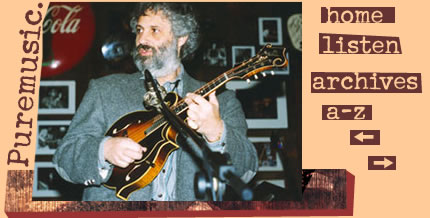
A Conversation with David Grisman (continued)
PM: For the kids, too, or just for yourself?
DG: Well, no, I have a TV, but I don't have cable. My twelve-year-old, he's a big sports fan, so he would prefer it, but he's not here all that much. Somebody did give me a satellite dish, and I may have it hooked up, but I'm really not -- you know, TV gives me the creeps.
PM: Yeah.
DG: [sighs]
PM: [laughs] I hear ya.
DG: I mean, it's just so much everything that's bad with culture, right there for you.
PM: Yeah, you'll find it all there.
DG: Yeah, that's where it is, that's at home. So I don't know. Plus the news is depressing. And it's just insidious, the way they deal with things. They'll take some big story, like some kid shoots 12 people in a high school, and you'll just see that plastered over everything for three days.
PM: Right. Yeah, let's talk about it, let's think about it.
DG: Or the O.J. Simpson thing, the Bill Clinton thing. They just take this basically innocuous terrible stuff -- or it could be a war or anything -- and basically they're trying to get you glued to the TV set, so they can show their million-dollar commercials to you and get you buying whatever they're selling.
PM: That's a fact.
DG: And most often, it's the next show they're selling. I think TV is such a blatant advertisement for itself. It's self-perpetuating bullshit in its highest form.
PM: It would be as bad as if musicians were singing songs about music all the time. That would be boring as hell.
DG: Yeah, right, right. I don't know, it's just that I found myself watching it all the time [laughs], and I just don't have time for that anyway. I don't miss it at all. I never miss it. I mean, if I want to see a movie, I'll just rent a DVD. Or I have a large collection of DVDs. I maybe watch movies once a week. I just don't have time. And I don't feel like it's doing me that much good to be that connected with what's going on in the world. [laughs]
PM: Right, the baseness of culture.
DG: It's so terrible most of the time, that it's just hard to process. How do you deal with all the horrible stuff that's happening every day, you know?
PM: Yeah. I mean, now, you can have the pain of the whole world in your face 24 hours a day. [laughs]
DG: And I mean, hey, enough of it filters through. I mean, I look at headlines at the [laughs] boxes with newspaper in it. And you know, when I go on the road, I'll turn on the TV sometimes. If I'm in a hotel, I'll watch a little TV. But basically... Plus it's real expensive. And they'd always be shutting off my cable because I was forgetting to pay the bill.
PM: [laughs] The mandolin as an instrument, it has enjoyed some pretty serious ebbs and flows in popularity in the country, right? Wasn't there a time there where, you know, mandolin orchestras were kind of big?
DG: Yeah. The first 20 years of the last century.
PM: But mandolin seems to be on the rise again, doesn't it?
DG: It seems to be really going full-blast big-time right now. There are so many mandolin manufacturers now, it's mind boggling.
PM: Yeah, who woulda thunk it?
DG: Well, I probably would have -- I probably did for many years, you know.
PM: [laughs]
DG: Sorry, I did. It's a great thing, but it's hard to even know -- I mean, I can't know -- the tree in the forest, it's hard for me to know how big this thing is.
PM: Yeah, right, a tall tree in the forest to boot.
DG: But there seems to really be a kind of a renaissance going on now.
PM: Yeah. It's a beautiful thing. And I like to see the whole mandolin family growing. I mean, there's so many mandolas out there now, so many octave mandolins, everything.
DG:
That's the truth. That's great. Mandocellos, the whole nine yards.
continue
print PDF listen to clips puremusic home